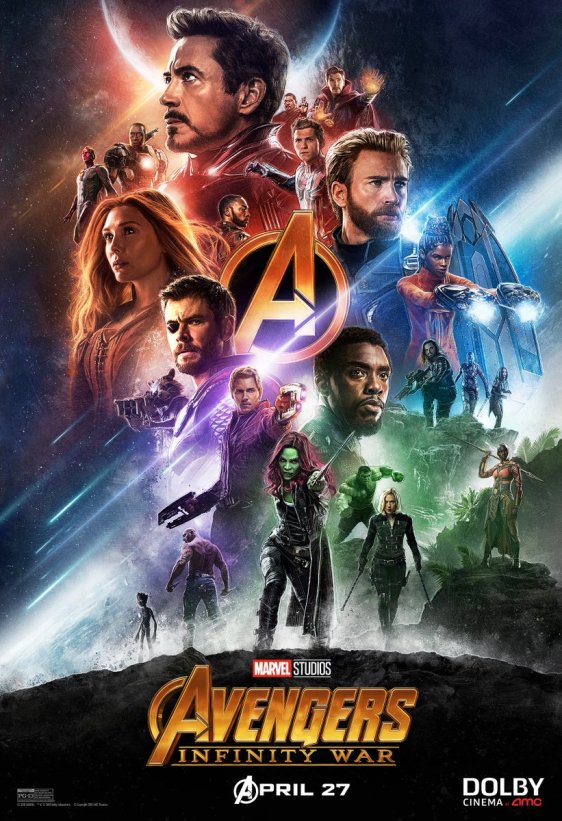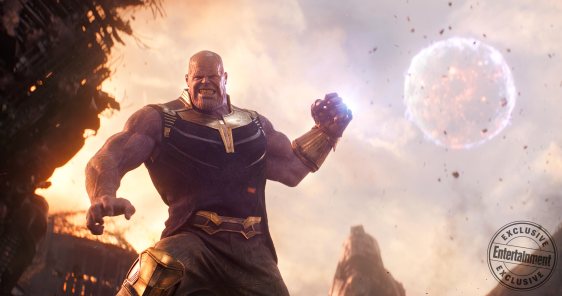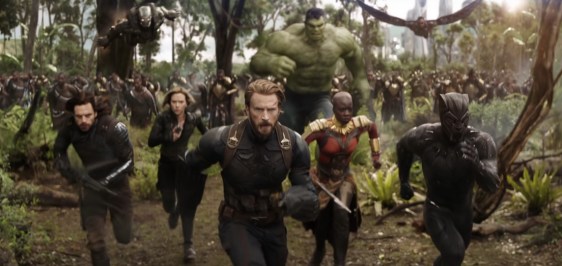The problem at the heart of Avengers: Infinity War is a particular moment with Drax (Dave Bautista) and Mantis (Pom Klementieff), two of the Guardians of the Galaxy. These two comic-relief characters get…cubed. Disassembled, initially like action figures, and then into a pile of bloodless cold cuts. Marvel’s biggest, baddest baddie, Thanos (Josh Brolin), the mastermind behind the Chitauri invasion in the first Avengers film, has gotten his hands on a brand new Infinity Stone (one of six that he needs to slaughter half the life in the universe). When these two heroes rush in to attack him, he…kills them, with a mere flick of his gauntleted wrist. That’s a spoiler, right? It seems like it ought to be. It’s two major characters, one of which we care about (sorry, Mantis), suddenly ceasing to be. No fuss, no ceremony – for them, just like flicking off a lightswitch. And that’s war. War isn’t concerned with narrative tidiness, box office figures, a character’s popularity or franchise plans, or films that are already in production. It isn’t concerned with speeches or badass moments or whether a particular death is convenient or well-timed. But in this war, these two people are alive again before the scene is over, for reasons that aren’t at all clear or necessary. And this needless reversal hangs over the rest of the film. The problem with Infinity War isn’t that the stakes aren’t high, well-conceived, or involving characters whose fates we prize. The problem with Infinity War is that it’s unclear how much the ending – or any of these deaths – actually matter.
But the Russo Brothers (along with their screenwriting partners Christopher Markus and Stephen McFeely) definitely still know how to tell a sprawling ensemble superhero story. The team behind the last two Captain America films are back, and they manage to connect and weave a stunning number of narrative threads. I can only assume a maniacal yarn-board was involved with all the different tasks and intersecting paths that each group needed to follow over the course of the film. Thor (Chris Hemsworth), Hulk (Mark Ruffalo), and the Asgardian refugees who fled Ragnarok, the Guardians of the Galaxy soaring through space on no specific trajectory, the newly fractured Avengers back on Earth – with factions led by Tony Stark/Iron Man (Robert Downey, Jr.) and Steve Rogers/Captain America (Chris Evans) – and all the new additions, including Peter Parker/Spider-Man (Tom Holland), Vision (Paul Bettany), his girlfriend Wanda Maximoff/Scarlet Witch (Elizabeth Olsen), and Sir Not Appearing in this Film ([multiple]). On the other side are Thanos and his minions, the most memorable of which are Tom Vaughan-Lawlor as Ebony Maw, with the terrifying telekinesis powers, and Carrie Coon, whose chilling character voice and looming mo-cap performance as Proxima Midnight nearly redeems some otherwise shaky CGI. Thanos himself is a compelling enough villain, owing more to Brolin’s performance than the complexity or interest of his plan. The space-demon’s motivation is almost laughably simple – the universe has finite resources, life has infinite needs, and Thanos is the self-appointed game warden. In order for the universe to thrive, he must remove half of all living things.
This film’s action is unrelenting, and generally well-staged. One particularly epic battle takes place in Marvel’s newest elaborate sandbox, the nation of Wakanda, which is not just the Kingdom of T’Challa/Black Panther (Chadwick Boseman) but it has the distinction of being the most high-tech and defensible place this side of the Avengers compound to resist Thanos’ onslaught. The ensuing battle feels like high-tech Lord of the Rings, and it all takes place in daylight, with a clear sense of where it’s all happening, and how the tides of the battle are advancing with the addition of each hero. We know where everyone is, what they’re trying to accomplish, and what’s at stake if they fail. Given that this is two literal armies clashing, it doesn’t feel like quite the same sort of team superhero battle as the one above New York, but it does feel like a natural progression. At the same time, Thanos and his “children” are powerful enough that no individual Avenger (Hulk included) seems to be able to take them down solo – so this film is positively riddled with the sorts of superpowered team-ups that made both The Avengers and Captain America: Civil War such a visual feast. This didn’t feel like fan-service – it felt like a fight for survival. And when Thanos has the power to rip a damn moon out of the sky, tear it to pieces with tidal forces, and send a trillion tons of boulders raining down onto a planet where multiple heroes stand against him, it is a fight for survival. Even as the stakes get more and more bizarre (there’s a significant chunk of time where multiple heroes are trying to restrain Thanos’ hand from closing) it still led to some of the best clashes and visuals in the MCU.
Beyond the large-scale battles, the film does indulge in a bit of mistaken-identity superhero-on-superhero dueling, but this is kinda to be expected. It’s all the same snappy one-liners and quips we’ve seen before, as the various grand-egoed members of the MCU get to know each other for the first time. But with the exception of one extremely annoying moment involving Drax and a bag of space-nuts, the film eases up significantly on the bathos of the previous films, which – compared to an equally high-stakes, but ultimately much sillier, film like Thor: Ragnarok, is a welcome improvement. When Asgard, full of a bunch of nameless and faceless people we don’t care about, is threatened with destruction, it’s okay if we spend 40 minutes joking around with orgyist Jeff Goldblum and violent drunk Tessa Thompson in the garbage heap at the end of the universe. But if you laugh in the face of a dude who not only wants to slaughter trillions of sentient beings, but is gathering the magical means to make it happen, you kinda deserve your fate. At one point, Thor has a genuinely tense monologue in which he reflects on his long-term survival (we even get an exact age for him!). Hemsworth nails the moment, and it’s nice to see that this demigod has dropped the bombast and embraced the tragedy. He gets how important this is, and he’s acting accordingly.
The script is also full of some solid thematic and narrative parallels – characters demanding (and refusing) similar sacrifices of each other, and changing their minds or having their choices suddenly reversed due to external factors. There’s not a lot I can say here without spoiling key moments, but suffice to say, the script plays a bit like a novel, wherein all of these heroes are dealing with the fundamental question of what it means to be a hero, and what it means to sacrifice one’s own life, or the life of a loved one, in the face of destruction this thorough and total. In short, they grapple with the needs of the many, even as the sole champions who stand a chance of protecting them. All of the good guys seem to err on the side of not trading lives, and the film seems content to let them wallow in this position even when it’s the most dangerous option available. And that’s where a lot of the film’s tension comes from. There are several moments where it seems as if Thanos’ plan could be derailed if only these heroes would act a bit less like…heroes. A few of them seem to get it. Doctor Strange (Benedict Cumberbatch) is evoking his best Doctor Who as he assures the audience that this is all part of the endgame. And you should trust that dude. He’s essentially a Time Lord at this point.
This is no secret war. There’s no S.H.I.E.L.D. hunkering down behind the scenes to wipe memories and clean up artifacts. Everyone’s fate is laid bare in the face of a hyperrationalist butcher who’s just waiting for the chance to snap his fingers and lay waste to the universe at random. The film has the good sense to treat this threat as genuinely terrifying. And yet, I can’t help but notice the offscreen ways in which it undermined its own tension. Remember the Nova Corps on Xandar, who – after a rough-and-tumble space battle with Ronan the Accuser – ended up in possession of the Power Stone at the end of Guardians of the Galaxy? Sorry, in a single throwaway line, the Maw tells us that Thanos “decimated” Xandar (apparently one-in-ten was enough for him there – *pedantic twirl*), presumably because no one was around to prevent the stone’s theft with an epic dance battle this time. And Thor? Saving a bunch of his own people from Ragnarok? Not for long. Just as Ripley spends all of Aliens saving Newt, only to have her die before the opening credits of the next film, Thor: Ragnarok will probably remain a better film if you just pretend this one doesn’t exist. But with all of these off-screen reversals of previous films in mind (despite Marvel’s likely-futile efforts to keep Phase 4 of the MCU a secret until next year), it’s hard not to think that this ending could be undone with a single line of dialogue, or flick of the magic wrist.
But who knows. Dour cliffhangers are hard to pull off, but my reaction to them has generally been positive. In the case of Star Wars: The Last Jedi (to which I suspect this film may invite comparison), I said the film has sufficient thematic depth to stand on its own even if the Abramsverse retreats from it in some future installment (and Abrams at least had the good sense to leave the Planet Vulcan spaghettified). Ditto Empire Strikes Back, obviously. Hell, I even enjoyed the second Pirates of the Caribbean film despite its explicitly-stated intention to reverse the on-screen death of Captain Jack Sparrow, which had occurred not five minutes earlier. I won’t pretend my reaction to this sort of ending is rational or consistent, but I will say that this one bummed me out (and literally haunted my dreams) in a way that felt like a deliberate choice. And if the Russo Bros and their corporate overlords allow some or all of the consequences of this film to hold steady, I expect I’ll have greater respect for what they’ve accomplished here. But I really can’t evaluate this film on that basis. For what it is, even renouncing all outside knowledge, Avengers: Infinity War is ambitious, narratively complex, and generally delivers on its promises.
But it is a true sequel, insofar as it has little time to add emotional depth to any of its characters. Like a late Harry Potter film, it trusts its audience to care just enough about its characters going in, since it has precious little time to hand out moments of humanity: Colonel Rhodes (Don Cheadle) hanging up on a holographic General Ross (William Hurt), who’s giving him feckless grief over the now thoroughly-irrelevant Sokovia Accords. Wanda and Vision trying their best at a May/December, MagicLady/Cyborg romance, including a Scottish hideaway together, which is sweeter than it has any right to be. Bruce Banner reuniting with Natasha (Scarlett Johansson), and the two scarcely sharing a word past “Hi, Nat”, but a look that suggests there’s more to say if they ever get the time. And Bruce himself finally finding time to deal with the consequences of his two-year Hulkatus between Ultron and Ragnarok, which works surprisingly well. Everyone fights – even the ones who don’t get much else to do. There’s a lot here, and while I feel a bit troubled and indignant in advance about the ending, I’m not sure how fair that really is. Over in DC-land (where Wonder Woman is the only thing they haven’t f’d up since Christopher Nolan stopped directing), Justice League strove – mostly unsuccessfully – for this kind of depth, and that film failed because it made almost none of the competent preparation necessary to earn those moments. If nothing else, the MCU has earned this. And for now, I think I can give them the benefit of the doubt. Then again, I regretted my 8/10 Ultron review within a couple months, so we’ll see what happens.
FilmWonk rating: 7 out of 10



Pingback: Jon Favreau’s “Iron Man” (presented by 10 Years Ago: Films in Retrospective) | FilmWonk
Pingback: Ten Years Ago: Iron Man – 10 Years Ago: Films in Retrospective
Pingback: FilmWonk Podcast – Episode #131 – “Anon” (dir. Andrew Niccol), “Avengers: Infinity War” (dir. Russo Bros.) | FilmWonk
Pingback: Brad Bird’s “Incredibles 2” – The make-or-break Pixar sequel | FilmWonk